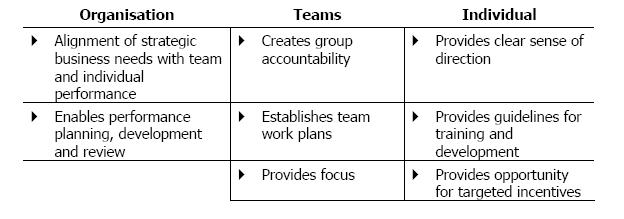What do most people think of when they hear the term ‘performance management’? For many, it signifies an unpleasant performance appraisal session, either as a giver or a receiver. The next thing that may come to mind is that it is a paper-work-intensive, ineffective system that gets in the way of employees doing ‘real work’ in an organisation.
What Is Performance Management
Below is a workable definition of performance management:
Performance management is the process of planning, implementing, monitoring, improving and sustaining the efficiency and effectiveness of organisations, teams and individuals.
When examined closely, it is clear that this definition contains three main concepts.
They are the following:
- It indicates that the process applies at three integrated levels namely:
- The organisation as a whole.
- Units within the organisation (divisions, departments, teams, etc.).
- Individual staff members.
It indicates that the process has five major components:
- Planning and contracting performance requirements.
- Implementing planned activities.
- Monitoring and measuring performance levels.
- Improving activities.
- Sustaining achieved performance levels.
It is important to realise that improving efficiency and effectiveness refers to both whether in individuals, teams or organisational context:
- Improving performance; and
- Developing skills and knowledge.
It can be concluded that performance management encompasses both the aspects of performance improvement and the development of human resources. Performance can only be improved to a limited point without the development of the skills and knowledge of the people from whom the improved performance is expected. The most effective performance management system therefore focuses on these two diverse aspects of performance management separately: “What the company gets out of it” and “What the employees get out of it”. It needs to be a balanced, two-way beneficial agreement if you want to ensure success.
The performance management system should therefore:
- Focus on performance improvement mainly to achieve the organisation’s current performance requirements with current available human resource potential.
- Focus on the development of human resources to enable the organisation to reach its vision and future performance objectives such as reducing cost, improving quality and increasing productivity in an ever-changing competitive environment.
Although these two issues cannot really be separated from each other, it is advisable to address them separately for functional purposes.
A Performance Management System, therefore, holds benefits for an organisation on three diverse but aligned levels:

Performance Management is an integral part of day-to-day staff management, but it is specifically focused on improving individual performance and developing individual skills and knowledge, which in turn leads to better team and organisation performance.
It is clear that people cannot be effective unless:
- They know what they are supposed to do.
- They are capable of doing it.
- They receive feedback on how they are doing.
The purpose of a performance management system is therefore to:
- Help organisations meet objectives and carry out major initiatives.
- Identify ways in which people can contribute to their work team.
- Provide people with a complete picture of what results are to be achieved and how to achieve them.
- Extend thinking beyond a one-time appraisal to an ongoing, day-to-day process.
- Help people improve their performance, ensuring job success.
We can therefore conclude that the purpose of the performance management process is to translate organisation strategy in such a way that everybody in the organisation understands what his/her specific contribution is in achieving the organisations’ strategy.
Who is Responsible for Performance Management?
Performance management is the responsibility of all stakeholders (shareholders, executive management, line management, human resources, unions and employees).
If developed, implemented and managed correctly, performance management can be to the advantage and advancement of everybody in the organisation.
